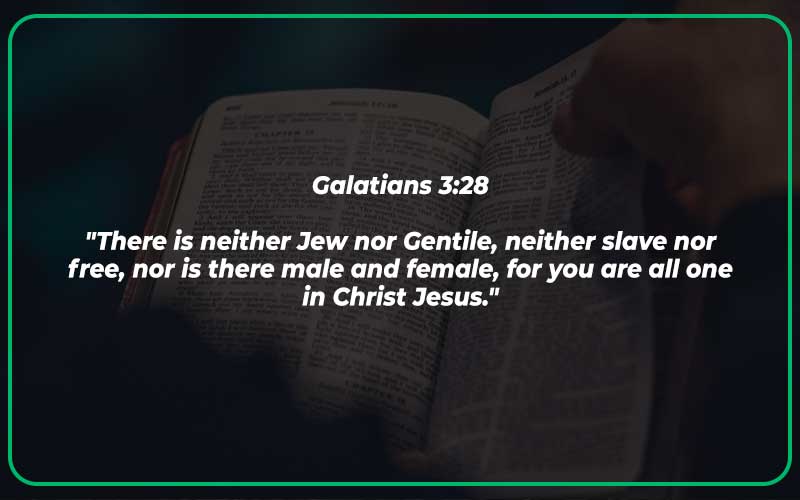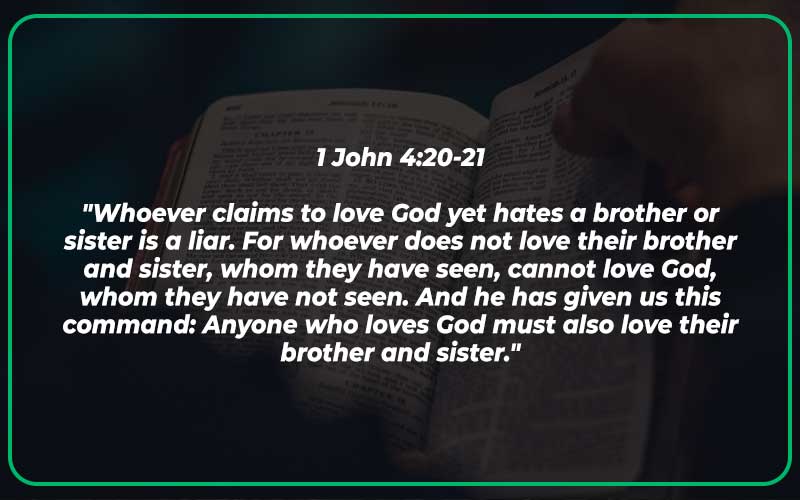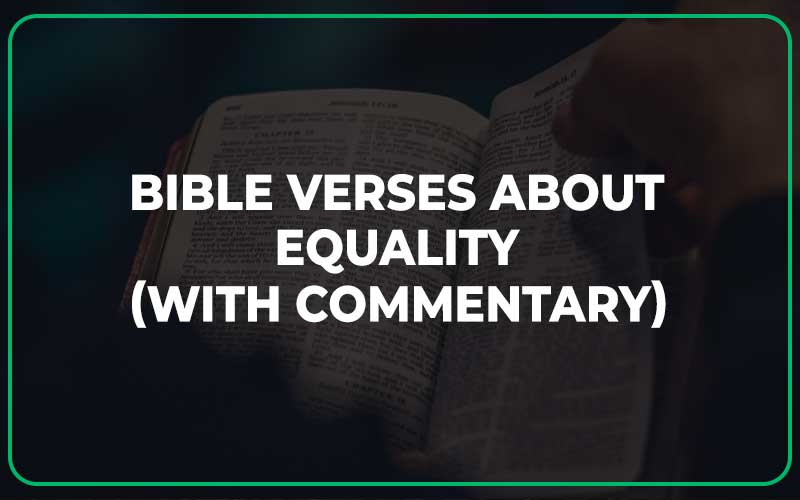The Bible is a powerful guide for life, filled with words of wisdom and guidance for all aspects of our lives. One important theme that is consistently emphasized throughout the Bible is equality.
The concept of equality can be found in various verses and passages, reminding us of the importance of treating others with fairness and respect.
Today, we will explore some Bible verses about equality and how they can inspire us to promote love and acceptance in our daily lives.
Also Read: 25 Bible Verses About Angels Appearance (With Commentary)
Bible Verses About Equality
Genesis 1:27
“So God created mankind in his own image, in the image of God he created them; male and female he created them.”
Genesis 1:27 teaches us that every human being, regardless of gender, is created in the image of God. This verse underscores the intrinsic worth and value that each person possesses, emphasizing the equality between men and women.
As Christians, it is crucial to recognize and respect the equal dignity of all individuals, celebrating the diversity and uniqueness that each person brings to the world.
Galatians 3:28
“There is neither Jew nor Gentile, neither slave nor free, nor is there male and female, for you are all one in Christ Jesus.”
In Galatians 3:28, Paul emphasizes the unity of believers in Christ. Regardless of race, social status, or gender, all believers are united in their faith. This verse dismantles any notion of superiority or hierarchy based on external factors and highlights the equal standing that all believers have in Christ.
In light of this truth, Christians should strive for unity and equality in their relationships with one another, breaking down divisions and promoting love and acceptance.

Proverbs 22:2
“Rich and poor have this in common: The LORD is the Maker of them all.”
Proverbs 22:2 reminds us that God is the creator of all people, regardless of their socioeconomic status. It reminds us that no one is inherently superior or inferior because of their wealth or poverty.
God values each individual and desires that His followers treat all people with fairness and respect, regardless of their financial standing. This verse challenges us to examine our attitudes towards wealth and poverty and to advocate for justice and equality in society.
Isaiah 56:4-5
“For this is what the LORD says: To the eunuchs who keep my Sabbaths, who choose what pleases me and hold fast to my covenant— to them I will give within my temple and its walls a memorial and a name better than sons and daughters; I will give them an everlasting name that will endure forever.”
In Isaiah 56:4-5, God declares His love and acceptance for those who might be marginalized or excluded. Eunuchs in biblical times faced discrimination and were often seen as social outcasts.
However, God promises to bestow honor and blessings upon those who remain faithful to Him, even in the face of adversity. This verse teaches us that God values all individuals, regardless of their circumstances or societal status, and offers them a place of belonging and identity in His kingdom.
James 2:1-4
“My brothers and sisters, believers in our glorious Lord Jesus Christ must not show favoritism. Suppose a man comes into your meeting wearing a gold ring and fine clothes, and a poor man in filthy old clothes also comes in. If you show special attention to the man wearing fine clothes and say, ‘Here’s a good seat for you,’ but say to the poor man, ‘You stand there’ or ‘Sit on the floor by my feet,’ have you not discriminated among yourselves and become judges with evil thoughts?”
James 2:1-4 warns against the sin of showing favoritism or partiality based on someone’s external appearance or social status. As followers of Jesus, we are called to treat all individuals equally, regardless of their economic circumstances.
This verse challenges us to examine our own hearts and attitudes towards others, urging us to resist the temptation to judge or discriminate based on worldly standards. It reminds us that true love and compassion extend to all people, regardless of their external circumstances.
Leviticus 19:34
“The foreigner residing among you must be treated as your native-born. Love them as yourself, for you were foreigners in Egypt. I am the LORD your God.”
In Leviticus 19:34, God calls His people to show love and compassion to foreigners or immigrants living among them. This verse emphasizes the importance of treating all individuals, regardless of their nationality or ethnicity, with equality and respect.
As Christians, we are to extend hospitality and kindness to those who may be different from us, remembering that we too were once strangers and aliens in need of God’s grace. This verse challenges us to overcome prejudices and biases, embracing diversity and promoting a culture of inclusivity.
Acts 10:34-35
“Then Peter began to speak: ‘I now realize how true it is that God does not show favoritism but accepts from every nation the one who fears him and does what is right.’
In Acts 10:34-35, Peter declares that God is impartial and does not show favoritism based on nationality or ethnicity. This truth was especially profound for Peter, who had previously held prejudices against Gentiles.
Through a vision from God, Peter learned that the gospel is meant for all people, regardless of their background. As followers of Christ, we are called to embrace this truth and reject any form of discrimination or bias. This verse reminds us that God’s love is inclusive and that the message of salvation is available to people from every nation and culture.
Matthew 7:12
“So in everything, do to others what you would have them do to you, for this sums up the Law and the Prophets.”
In Matthew 7:12, Jesus gives His disciples the golden rule, which teaches that we should treat others the way we want to be treated. This principle of reciprocity underlines the importance of equality and fairness in our interactions with others.
It challenges us to examine our actions and consider how they align with our desire for justice, compassion, and mutual respect. The golden rule calls us to go beyond just treating others well; it calls us to actively promote equal treatment and advocate for justice in all areas of life.
Luke 10:25-37
“But he wanted to justify himself, so he asked Jesus, ‘And who is my neighbor?’ In reply, Jesus said: ‘A man was going down from Jerusalem to Jericho when he was attacked by robbers. They stripped him of his clothes, beat him and went away, leaving him half dead. A priest happened to be going down the same road, and when he saw the man, he passed by on the other side. So too, a Levite, when he came to the place and saw him, passed by on the other side. But a Samaritan, as he traveled, came where the man was; and when he saw him, he took pity on him. He went to him and bandaged his wounds, pouring on oil and wine. Then he put the man on his own donkey, brought him to an inn and took care of him. The next day he took out two denarii and gave them to the innkeeper. ‘Look after him,’ he said, ‘and when I return, I will reimburse you for any extra expense you may have.’ Which of these three do you think was a neighbor to the man who fell into the hands of robbers?’ The expert in the law replied, ‘The one who had mercy on him.’ Jesus told him, ‘Go and do likewise.'”
Luke 10:25-37 narrates the parable of the Good Samaritan, teaching us the importance of showing compassion and love towards all people, irrespective of their background. In this story, Jesus contrasts the actions of a religious leader and a Samaritan.
Although the religious leaders had the religious knowledge, it was the Samaritan, who was considered an outcast, that demonstrated true neighborly love. This parable challenges us to break free from societal prejudices and to actively seek out opportunities to extend love and mercy to those around us, regardless of their ethnicity, religion, or social position.
Romans 12:16
“Live in harmony with one another. Do not be proud, but be willing to associate with people of low position. Do not be conceited.”
Romans 12:16 encourages believers to live in harmony and peace with one another. It cautions against pride and encourages humility, urging Christians to be willing to associate with those who are considered to have low status in society.
This verse highlights the importance of treating all individuals with dignity and respect, regardless of their position or rank. It challenges us to cultivate a spirit of unity and to actively reject any demonstrations of superiority or elitism. True equality requires us to embrace humility and to recognize the equal worth and value of all people.
Colossians 3:11
“Here there is no Gentile or Jew, circumcised or uncircumcised, barbarian, Scythian, slave or free, but Christ is all, and is in all.”
In Colossians 3:11, Paul highlights the inclusive nature of the body of Christ. He asserts that in Christ, all worldly distinctions and categories are rendered irrelevant. Regardless of someone’s cultural or social background, all believers are united in Christ.
This verse challenges us to reject any form of discrimination or prejudice based on ethnicity, cultural differences, or social standing. It reminds us that our identity as Christians should shape our attitudes and actions towards others, fostering an environment of love, acceptance, and equality.
Matthew 22:37-39
“Jesus replied: ‘Love the Lord your God with all your heart and with all your soul and with all your mind.’ This is the first and greatest commandment. And the second is like it: ‘Love your neighbor as yourself.”
In Matthew 22:37-39, Jesus summarizes the two greatest commandments – to love God and to love one’s neighbor. The command to love one’s neighbor with the same self-love emphasized here calls us to see the inherent value and worth of every individual.
This verse challenges us to examine how we treat others, urging us to display love, kindness, and respect towards everyone. True love is not selective but encompasses all people, embracing the principles of equality and justice in our relationships.
Proverbs 31:8-9
“Speak up for those who cannot speak for themselves, for the rights of all who are destitute. Speak up and judge fairly; defend the rights of the poor and needy.”
Proverbs 31:8-9 calls believers to be advocates for those who are marginalized or oppressed. It urges us to use our voice and influence to defend the rights of those who cannot speak for themselves, particularly the poor and needy.
This verse emphasizes the importance of speaking out against injustice and standing up for equality. It challenges us to actively engage in the pursuit of social justice, breaking down barriers and promoting equality in our societies.
Luke 6:31
“Do to others as you would have them do to you.”
Luke 6:31 echoes the golden rule mentioned earlier, emphasizing the importance of treating others with fairness, kindness, and respect. This verse serves as a powerful reminder that one’s actions and attitudes towards others should reflect the values and principles that they desire for themselves.
It is a call to treat all individuals equally, regardless of their background or circumstances. This verse challenges us to examine our own behavior and consider how we can actively promote equality and justice in our daily interactions with others.
Psalm 82:3-4
“Defend the weak and the fatherless; uphold the cause of the poor and the oppressed. Rescue the weak and the needy; deliver them from the hand of the wicked.”
Psalm 82:3-4 calls believers to defend the rights and wellbeing of those who are vulnerable and oppressed. It urges us to speak up for the weak, provide for the fatherless, and uphold the cause of the poor.
This verse emphasizes the responsibility Christians have to actively pursue justice and equality in society. It challenges us to use our resources, voice, and actions to fight against injustice and to advocate for those who face discrimination or disadvantage. This verse inspires us to align our hearts with God’s heart for the oppressed and to actively pursue a more equitable and just world.
Deuteronomy 16:19-20
“Do not pervert justice or show partiality. Do not accept a bribe, for a bribe blinds the eyes of the wise and twists the words of the innocent. Follow justice and justice alone, so that you may live and possess the land the LORD your God is giving you.”
Deuteronomy 16:19-20 emphasizes the importance of upholding justice without showing partiality or accepting bribes. This verse highlights the equality that should be present in the administration of justice.
It cautions against the corruption that can arise when justice is compromised or withheld from certain individuals or groups. As Christians, this verse challenges us to promote equality and fairness in all aspects of life, ensuring that justice is accessible to everyone. It reminds us that pursuing justice is not only a moral imperative but also brings blessings and life to our communities.
Romans 2:11
“For God does not show favoritism.”
Romans 2:11 reminds us that God does not show favoritism or partiality towards any individual. This verse shatters any notion of superiority or entitlement based on external factors such as ethnicity, nationality, or social standing.
It affirms the equality and worth that each person possesses in the eyes of God. As followers of Christ, we are called to imitate this impartial love and to extend it to others. This verse challenges us to reject any prejudices or biases that may hinder us from treating all people equally and with love, grace, and mercy.
1 John 4:20-21
“Whoever claims to love God yet hates a brother or sister is a liar. For whoever does not love their brother and sister, whom they have seen, cannot love God, whom they have not seen. And he has given us this command: Anyone who loves God must also love their brother and sister.”
1 John 4:20-21 emphasizes the connection between loving God and loving others. This verse challenges believers to examine their relationships and ensure that their actions align with the principle of equality and love for all people.
To claim to love God while harboring hatred or discrimination towards others is hypocritical. This verse calls us to actively live out our faith by treating all individuals as our brothers and sisters in Christ, regardless of their differences. It prompts us to deeply consider our attitudes and actions towards others and to strive for reconciliation, unity, and love.

Proverbs 14:21
“Whoever despises his neighbor is a sinner, but blessed is he who is generous to the poor.”
Proverbs 14:21 affirms the importance of showing kindness and generosity to those who may be in need. This verse reveals that those who disdain or mistreat their neighbor are sinning against God.
It emphasizes the value of compassion and equality, encouraging believers to extend a helping hand to the poor and underprivileged. This verse calls us to reflect on our own attitudes and actions towards those around us, challenging us to cultivate a heart of generosity and love. True blessings are not found in acts of superiority or discrimination, but rather in acts of kindness and compassion towards all people.
1 Samuel 16:7
“But the LORD said to Samuel, ‘Do not consider his appearance or his height, for I have rejected him. The LORD does not look at the things people look at. People look at the outward appearance, but the LORD looks at the heart.”
1 Samuel 16:7 reminds us that God’s perspective differs from that of humankind. While humans tend to judge based on appearances, God looks beyond the exterior and sees the heart. This verse underscores the importance of valuing people for who they truly are, rather than making judgments based on worldly standards.
It challenges us to reject the notion that external factors such as wealth, appearance, or social status determine an individual’s worth. As followers of Christ, we are called to emulate God’s perspective and treat everyone with the love and respect they deserve, recognizing the inherent equality and worth that God has placed within each person.
What does the Bible say About Equality?
In the Bible, the principle of equality is rooted in the belief that all individuals are created in the image of God (Genesis 1:27). This foundational concept underscores the inherent worth, dignity, and value of every person, regardless of race, gender, social status, or background.
Throughout Scripture, there are numerous instances where the importance of treating others with fairness, justice, and equality is emphasized. For instance, Galatians 3:28 highlights that in Christ, there is no distinction between different groups – whether it’s regarding gender, ethnicity, or social standing. This verse emphasizes that we are all one in Christ Jesus.
The teachings of Jesus also consistently emphasized the value of every individual, advocating for compassion, love, and respect for everyone. Jesus challenged societal norms by interacting with people from diverse backgrounds, showing love and compassion without regard to their status or background.
Moreover, the Bible instructs us to care for the marginalized and oppressed, to seek justice, and to show kindness to all. Proverbs 22:2 expresses the idea that God, as the maker of all, sees everyone as equal and values them equally.
However, it’s important to recognize that while the Bible emphasizes equality and the value of every individual, it was written in different cultural contexts. Interpretations of certain passages may differ, and historical context is crucial for understanding the intended message behind specific verses.
As believers, our responsibility lies in practicing equality, treating everyone with fairness, dignity, and respect, mirroring the example set by Jesus Christ and embodying the principles of love and compassion towards all individuals, regardless of differences.

